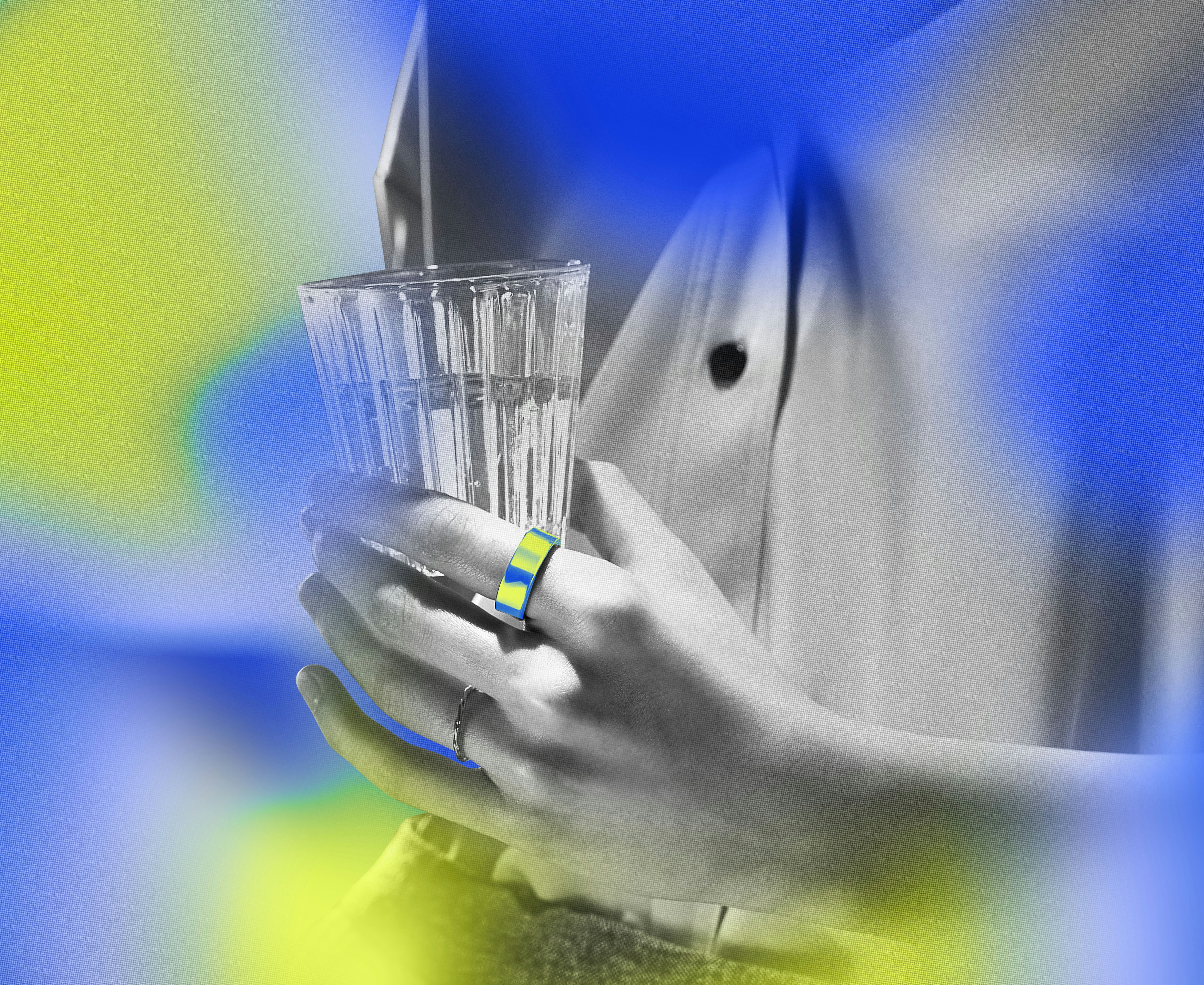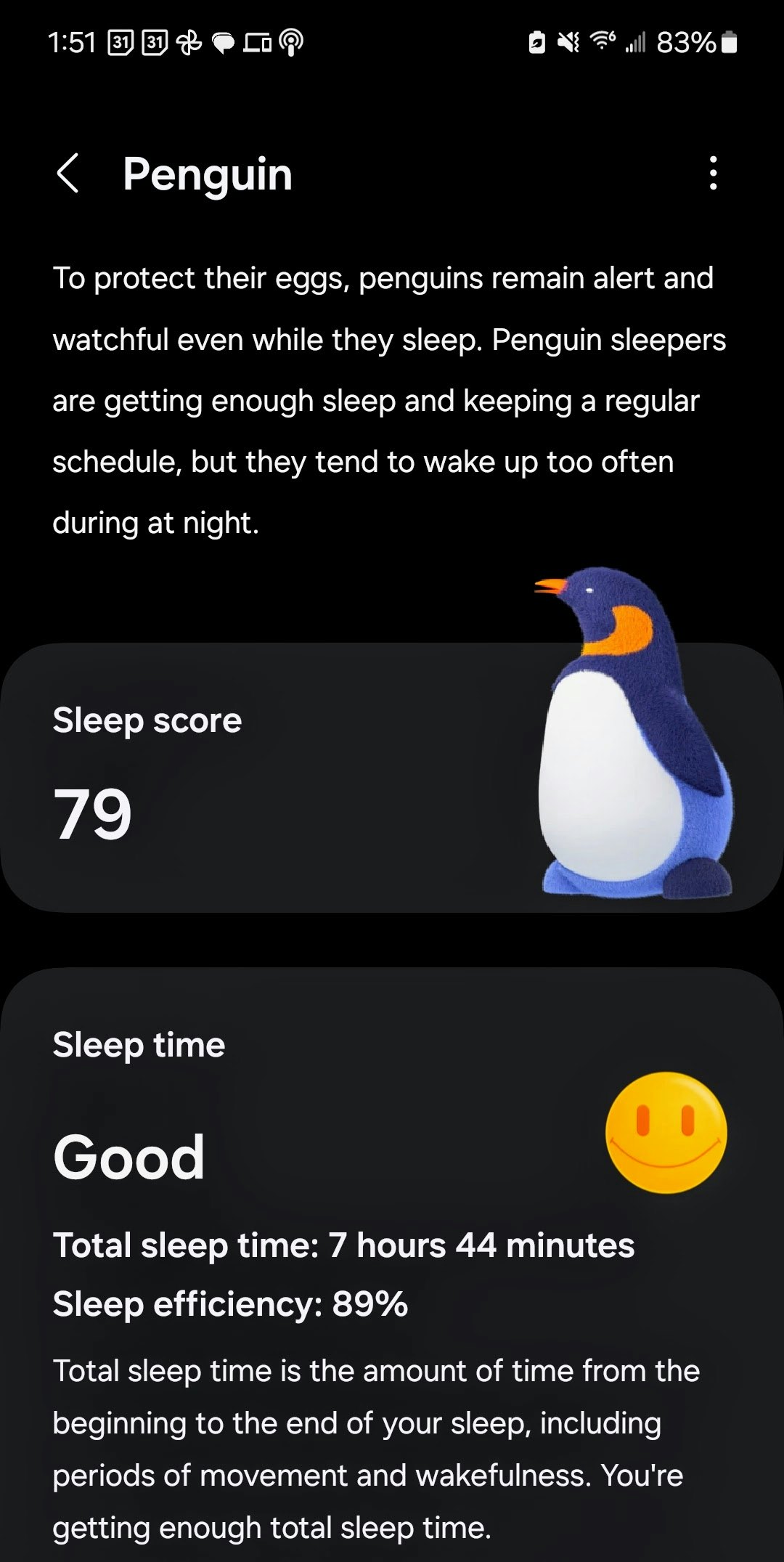When I sit down and really reflect on my sleep habits, a sense of inadequacy, guilt, and a bit of anxiety creeps in. Most evenings, I spend an untold amount of time awake at 2 a.m. with what I would call “night thoughts.” You know the stuff — replays of work missteps, relationship blunders, personal insecurities, and a counting of the espressos and nutritional choices I made that lead to this sleeplessness. It gets worse: More evenings than I care to admit, I allow my son to crawl into bed where he spins, kicks, and wreaks havoc with the blankets. With some frequency I sneak in some weekday television, early bedtime be damned. And yet, a week into tracking sleep with the Samsung Galaxy Ring ($400), the Samsung Health app offers up my sleep animal: A lion.
“As a lion sleeper, you have a healthy sleep pattern,” the app tells me. I would remain in disbelief if it weren’t for the data to back that up. I sleep just a hair under 8 hours on the regular, usually near the same time. My night-time interruptions are apparently short and possibly more in my head than in the reality of my bed. My sleep isn’t as bad as I thought. But with all this data, could I actually sleep better? Can sleep trackers help us to get more zzzs? The answer isn’t all that straightforward.
The Rise Of The Ring
Sleep tracking is a booming business. According to a 2023 survey from the American Academy of Sleep Medicine, some 35 percent of adults have given sleep tracking a go. It’s not surprising. Smart Watches abound and nearly all of them have sleep tracking built in. The maturation of the smart ring, though, a product that’s been around in various forms for about a decade, has made sleep tracking so much more enticing.
This year, the first big smartphone maker entered the space with the Samsung Galaxy Ring. Much like the Oura, the biggest name in smart rings before Samsung, the Galaxy Ring is slim, elegant even, and hardly noticeable. In other words, it’s the ideal sleep tracker.
The sensors gather blood oxygen data, skin temperature, heart rate, respiratory rate as well as movement. Put together this isn’t quite a medical grade sleep tracker, but it does a good, lab-tested job gathering an abundance of raw data.

A Boon For Really Bad Sleep
So it’s a quality product, but is it helping my sleep? The science says definitely, maybe. Studies have shown that much of the data is for the most part accurate, even if many of the interpretations of the data — depth of sleep especially — are not exactly up to snuff from a professional standpoint. The real question is can such data change behavior? The results are far less clear. A review of the research using commercially available technology that predates the Galaxy Ring shows … very little. “The compelling question as to whether sleep tracking is helpful or harmful for patients remains unanswered,” conclude the authors.
This isn’t true in all cases. The Samsung Galaxy Watch sleep apnea feature received De Novo authorization from the FDA on Feb. 9, 2024, just five months before the Ring came out. This means that the Samsung wearable could detect signs of moderate to severe obstructive sleep apnea and alert the user to potentially seek medical care. Sounds simple, but it’s an impressive testament.
“We were the first FDA for sleep apnea on the sleep watch side,” says Jeffrey Kim, a Senior Product Manager at Samsung. “If you have sleep apnea or a serious sleep disruption this kind of data is very very useful. The Ring will be a game changer in providing what we have with the sleep data on the Galaxy Watch and adding into it.”
I too found the benefits of sleep trackers to be most cogent in the face of serious health concerns. On my most voluminous night of sleep with the Ring this past August, I was suffering from Covid. I clocked in three consecutive days of nearly 11 hours of sleep and yet my score was very poor for each and every day. My heart rate was high, the app told me, and while I thought my sleep was, well, actually pretty great, the watch showed me that I got next to no “deep” sleep. Such a label is a matter of contention. Dr. Mandana Mahmoudi, clinical director of sleep medicine at NYU Langone Health, told The Strategist in no uncertain terms: “They absolutely do not have the ability to tell you when you’re in deep sleep, when you’re in superficial sleep, and how many times you’re actually waking up.” Other criticisms of trackers note that how you feel when you sleep is far more important and accurate than reading the label of sleep depth that any app gives you.

Still, I felt it. I wasn’t on the path to recovery exactly — not a restful one at least. I took the data and my feeling of unrest to heart and instead of pushing on in the waking days, I made sure to continue to go to bed ridiculously early for the next three nights. I recovered well, in both sleep score and in fighting off the virus.
Such an extreme piece of feedback was helpful. But what of the day-to-day where I can undermine my own sleep with, well, all the little unhealthy things we so often do to ourselves?
The Long Hard Road To Dreamland
Dr. Marie-Pierre St-Onge, PhD, founding director of the Center of Excellence for Sleep and Circadian Research at Columbia University has something of an answer to this. “While the devices are great to validate how you feel the next day,” she says, “the problem is there’s no one to tell you what to do with this information. What should I be doing today? What are the different things I should be thinking of? What can I do to change that?”
St-Onge suggests focusing on tracking down the causes of those less than perfect nights — your “fair” or “poor” sleep scores. “Did you have alcohol last night?” asks St-Onge. “Did you exercise? Are you going to the more granular level? Tracking takes time. It might take weeks or months to see these patterns.”
In other words, if you don’t have great sleep and want better sleep, it might take a long time to figure out what works for you. “And for some people, [this process] could induce anxiety,” adds St-Onge. “Which is obviously not what you want to happen.” If my Ring surprised me in the other direction — telling me I had worse sleep than I thought — I would probably be anxiously working to fix it now, undermining my sleep further by worrying so much about it.
Take the example of the food diary – the notion that by writing down everything you eat, you eat better. It’s logical — but its applications are limited. “I think tracking food is really good if someone wants to manage their weight,” says St-Onge, who has a doctorate in nutrition from McGill University. “It’s the easiest way to reduce your caloric input.” But beyond this, McGill says, “I don’t think it’s necessary.” At least not on an ongoing basis if you have a good handle on your diet.
Tracking For The Truth
But what tracking excels at doing — whether you’re looking at sleep, fitness, or diet — is shining a light on your habits. “It’s good to know what choices you’re making,” says St-Onge who touches on all this in her fantastic forthcoming book, Eat Better, Sleep Better. “Maybe track yourself for a certain period of time. Bring awareness and be aware of what you do.”
That awareness can’t be limited to one part of life. If you “start with a bad diet and think you’ll magically change your sleep and make it better — that’s a harder process,” says St-Onge. In the book, she points out a study where “those who stabilized their bedtimes lost weight and had lower levels of inflammation during a six-week study period compared to those who had variable bedtimes.” She goes on: “We’re following up on this idea with related research on the impact of regular rest and activity patterns. If you adopt a more regular sleep and activity/exercise schedule, will you have better blood sugar control and a healthier body weight? We’re hoping to answer that question in one of my current studies. (And I think the answer will be yes.)”
After a solid month with the Samsung Galaxy Ring, tracking my sleep, taking note of what I ate and did that day, some holistic health lessons came in full relief. What have I learned? That I feel so much more rested after a sleep on a day where I exercised even if my sleep score doesn’t inch up all that much. That having even just one too-big meal the previous day leads to poorer sleep. That a night cap sometimes leads to less good sleep, but caffeine after 2 p.m. always does. Are these useful lessons for me? Absolutely. Are they universal? Not by a long-shot.
That’s the beauty of tracking your personal data — it helps to keep you honest. If nothing else, that’s a lesson we can all live by.







